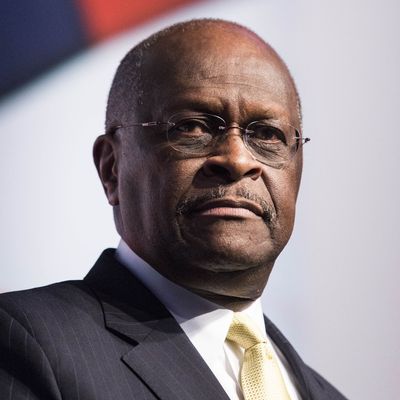
A little over two and a half years ago, Stephen Moore appeared at a conservative panel on the election and the economy, where one questioner asked about monetary policy. “Well, you know, I’m not an expert on monetary policy,” admitted Moore, before proceeding to deliver an answer bearing out this very confession. (The question concerned “cash flow velocity,” which Moore deflected by ignoring, retreating to a generality — “We want clear rules and a stable dollar” — and then changing the subject to regulation.)
In October, appearing on another panel, Moore demurred on another question about the Federal Reserve by noting, “I’m not a monetary economist, I’m not an expert on monetary policy.”
Moore could casually admit his non-expertise in the subject because, at that moment, it was impossible for anybody in the room, least of all Moore, to imagine that one day he might be nominated for a position on the Federal Reserve Board. The old “what is your greatest weakness?” interview question is one you’re supposed to answer by noting some peripheral trait or skill. You can say “monetary policy” — I’m no monetary policy expert, either — as long as the job you’re gunning for is not in central banking.
Yet here we are. President Trump’s two nominees for the Federal Reserve Board, Stephen Moore and Herman Cain, are in so far over their heads that not long ago they wouldn’t even pretend to be qualified in the field. Now the president is asking to nominate two obvious amateurs to the most powerful central bank in the world. Like many Trump-era episodes, this one combines existential terror with overt comedy. Moore resembles Martin Short’s character from the old Saturday Night Live sketch who has quit his job to compete in the Olympics in synchronized swimming even though he admits he’s “not a strong swimmer.”
Faced with the prospect of attempting to confirm two absurdly unqualified cranks for esteemed Fed positions, the conservative movement has undertaken a triage operation, focusing its defenses on Moore and leaving Cain to twist in the wind. The decision to save Moore at Cain’s expense makes some sense: Of the two, Cain’s kookery was on more colorful display through his slapstick 2012 presidential campaign. Cain’s treatment of women (numerous sexual-harassment lawsuits) is harder to defend than Moore’s (open adultery followed by failure to pay child support.)
Still, the defenses of Moore have a distinctly weary undertone. The Wall Street Journal endorses its former staffer, gamely notes that “as an individual Fed governor, Mr. Moore wouldn’t likely wield much influence.” Yes, “the alleged rap” on him is that “he has on occasion been wrong about monetary policy,” the editorial allows with considerable understatement. But it proceeds to point out that former Fed chairman Ben Bernanke made some failed predictions in 2003 and 2007.
That is fair enough. On the other hand, there is no known video of Bernanke begging off a question on monetary policy by saying he is not an expert in the subject. Nor have Bernanke’s erroneous predictions approached the level of nuttery evinced by Moore, who at times has called for the gold standard and cast doubt on the validity of official economic figures. (“Nobody believes the statistics out of Washington and often for good reasons,” Moore wrote in 2015.)
Moore’s errors are not only grotesque and borne of near-total ignorance of the field, they follow a consistent pattern: he demands the Federal Reserve choke the economy under Democratic presidents, citing imaginary inflation, and then veers wildly to the opposite extreme under Republican ones. Republicans already follow this principle on fiscal policy, toggling between hysterical demands for immediate drastic austerity under Democratic presidents to unrestrained profligacy under Republican ones. The Fed is designed to operate insulated from political pressure. Moore and/or Cain would break the seal on turning it into a partisan body.
Rather than attempt to discard his hack-ish reputation, Moore is leaning into his value as a political operative. “If the economy stays this strong for the next two years,” he gushed to a right-wing talk-show host this week, “Trump is going to win an overwhelming landslide reelection.” (This appearance, as well as his 2016 panels, were uncovered by Sam Bell.)
Politico reports that Cain’s nomination “may have actually eased” Moore’s confirmation prospects, because “Republicans may be hard-pressed to revolt against both of Trump’s nominees.” The sadly plausible assumption here is that Senate Republican willingness to oppose Trump is a finite resource. Therefore they may wave Moore through on the grounds that he is, on the margin, less flagrantly unqualified than Cain. The least-bad pick is the one who admitted he doesn’t know very much about the subject that is soon going to be his entire job.
This post has been updated.






























